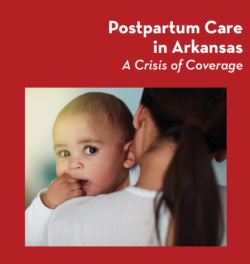
Babies need their mothers; children need their parents. Everyone should have the opportunity to raise their children and live out their full life expectancy. However, this opportunity is denied many babies and their mothers due to the mother’s death following childbirth.
In this brief we discuss the need for Arkansas Medicaid to extend maternity coverage from two months to 12 months postpartum. Postpartum care is health care for the mother following the birth of her baby. Among the main conditions faced by mothers during the first year of their babies’ lives include chronic diseases that can be prevented, such as increased blood pressure, diabetes, and heart disease.
Throughout the United States, thousands of women die or have near-death experiences while giving birth and up to one year following childbirth. Arkansas has one of the highest rates in the nation of mothers dying within one year of childbirth. Although the risk of death is highest during and shortly following birth, the Centers for Disease Control (CDC) has found that one-third of the deaths related to childbirth occurs up to one year following childbirth.
Most women in Arkansas received Medicaid support during their pregnancies in 2018. Two out of every three births in Arkansas were funded by Medicaid. Arkansas should move to extend health coverage to moms for the full year after they give birth.
Most pregnancy-related deaths are preventable, and many are related to loss of health coverage and access to care. Right now, many Arkansas women lose Medicaid coverage just two months after the end of their pregnancy, putting them at risk of lapse in medication or access to other supports, making it more difficult to care for their new baby as well as themselves.
Health coverage before, during and after pregnancy increases access to preventive care, improves health outcomes for mothers and children, and reduces maternal mortality rates. Ensuring that new moms have health coverage for 12 months after their pregnancy could help lower the rate of maternal mortality and morbidity and reduce disparities for women of color and women in rural communities.
Download the full report below
